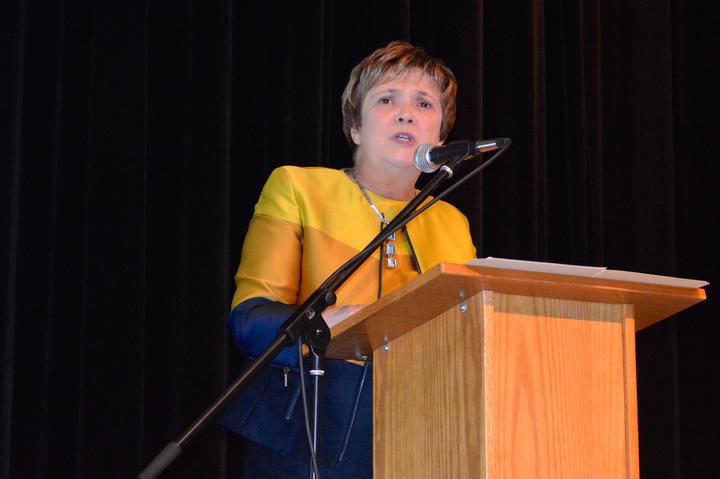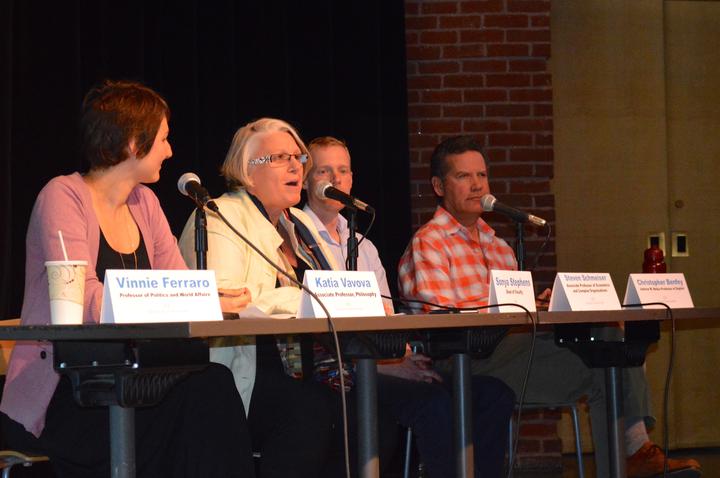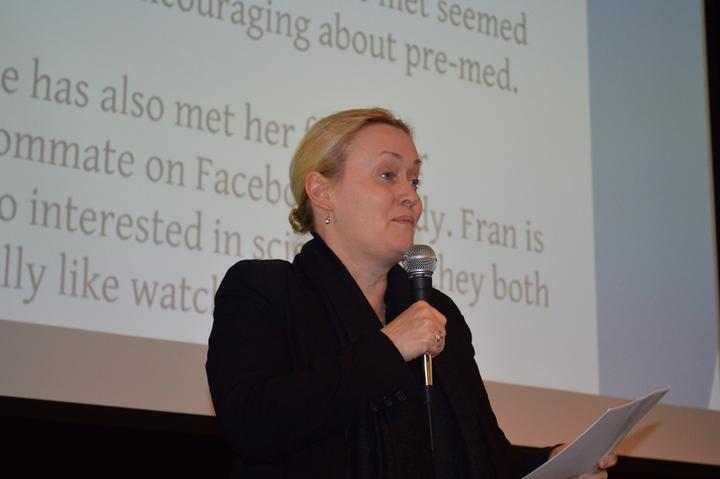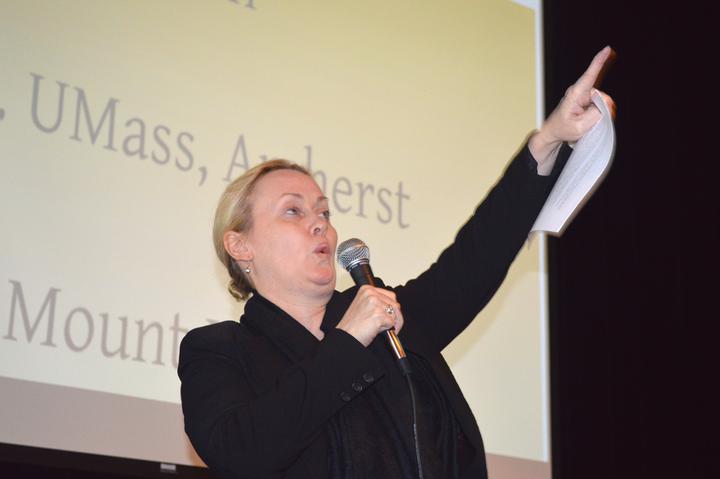60TH REUNION SYMPOSIUM
“W(H)ITHER THE LIBERAL ARTS?
Can the Humanities Thrive in a
Money-driven World?”
Panel Discussion with four professors,
moderated by Dean Sonya Stephens
Followed by
An interactive case study with
Professor Eleanor Townsley
Wink introduced our President Lynn Pasquerella who opened our symposium with the following words...
A few years ago, I delivered a keynote address for a symposium sponsored by Phi Beta Kappa. The title of my talk, “The Ketchup’s in the Bag and the Check is in the Mail,” was taken from a popular country song by Tim McGraw entitled “Would You like Fries With That?” and is an allusion to the old joke about why anyone would need a degree in the humanities with people’s lives on those who are already marginalized. There is a growing economic segregation in higher education, and the fact is that they humanities will remain secure in wealthy communities and at elite, private institutions like Mount Holyoke, which were built upon the foundation of liberal learning and its inextricable link to democratic engagement and civic responsibility. In contrast the humanities will be under increasing scrutiny at public institutions-community colleges, and other state colleges and universities.
This trend is troubling because the development of a humanistic sense enables individuals to discern the patterns that dominate their lives, and this opportunity should not be the exclusive purview of those like Casaubon. He may have been the most learned person in Europe during the sixteenth century, but his superior knowledge used in exclusive service to the King did not help him as he was being pelted in the streets by those denied access to his intellectual gifts. Nor did his namesake in Eliot’s Middlemarch reap the benefits of such scholarly erudition, sinking into paranoid, bitter loneliness in his inability to apply the very lessons of his theological training.
By pandering to those who demand a demonstration of the usefulness of the humanities and liberal arts, we revert to scientism. One cannot cope with complexity through fragmented consciousness and discourse, or flourish on an entire diet of bread and circuses. A world in which scientism replaces humanism is one in which the likelihood of flourishing is diminished. At the same time, there must be honest and perhaps radical reckoning with the extent to which those of us in the academy have failed to take seriously the concerns of those who are raising questions about the value added of a liberal education and how that education is connected to career opportunities for our students.
The class of 1955, celebrating its 60th reunion, has challenged us to confront this topic in a meaningful way. Yet, this is nothing new. As early as their fifth reunion in 1960, one class member wrote on her Alumnae Association questionnaire: I’d like to see “more integration of programs to develop a deeper meaning of the liberal arts.” Perhaps that opinion stemmed from the kind of employment opportunities then open to women. The Mount Holyoke Appointment Bureau — remember that?-- the mid-century version of the Career Development Center. The Appointment Bureau helped young women put their liberal arts degree to work by asking what jobs they had held in the past.
Consider these 1955 options:
Camp
Care for Children
Chambermaid
Hospital Work
Library
Lab work
Office
Playground
Selling
Table Waiting
Teaching or Tutoring
Tea Room
And DVBS
I know DVBS stands for Digital Video Broadcasting Systems. Back then, I am pretty sure it referred to director of Vacation Bible School.
As I am certain the Class of 1955 would be the first to tell us, the world of work and attitudes toward women are ever changing, and a liberal arts education must prepare our students not simply for that first job, but also—more importantly—for the long run. We now know that graduates may hold over a dozen jobs in their lifetimes. According to a recent study by the U.S. Bureau of Labor Statistics, young people are apt to hold as many as ten different jobs before age 40.
Last month, New York Ties columnist Nicholas Kristof wrote a compelling commentary about the need for the liberal arts. He opened his column with E. O. Wilson’s cogent words, “We are drowning in information, while starving for wisdom.” As I see students walking across campus with their heads tilted toward iPhone screens, I have to agree with Wilson.
The liberal arts move students’ minds beyond Google, and offer a deeply human comprehension of the world. Combined with the sciences, economics, computer studies, and a host of other fields—the liberal arts provide students with an education that bridges multiple modes of understanding.
Poet Emily Dickinson said, “My Business is Circumference.” Crafting a liberal arts education that is vibrant, reflective, connected and embraces circumference is, I believe, our best shot at wisdom.
Thank you, again, to the Class of 1955 for today’s panel. I hope you have a wonderful afternoon. And to all reunion classes joining us on campus this weekend, let me say once more welcome home. We are delighted that you are here.
Thank you
Then our newest Honorary, Dean of the Faculty, Sonja Stephens, began asking questions of our panel which consisted of: Katia Vavova (Assoc Prof of Philosophy); Stephen Schmeiser (Asst Prof of Economics and Complex Organizations); Chris Benfey (Prof of English); and Vinnie Ferraro (Prof of Politics & World Affairs).
They all made a powerful case for the liberal arts.
A Q & A followed giving everyone a chance to express their views and concerns.
Then our brilliant honorary, Eleanor Townsley, led us in a powerpoint presentation of a socioeconomic case study which you can see in its entirety by clicking on
(Click on the arrow in the bottom center of the footprints to activate the case study)
Although you didn't get to hear the panelists we hope you enjoyed the case study.



